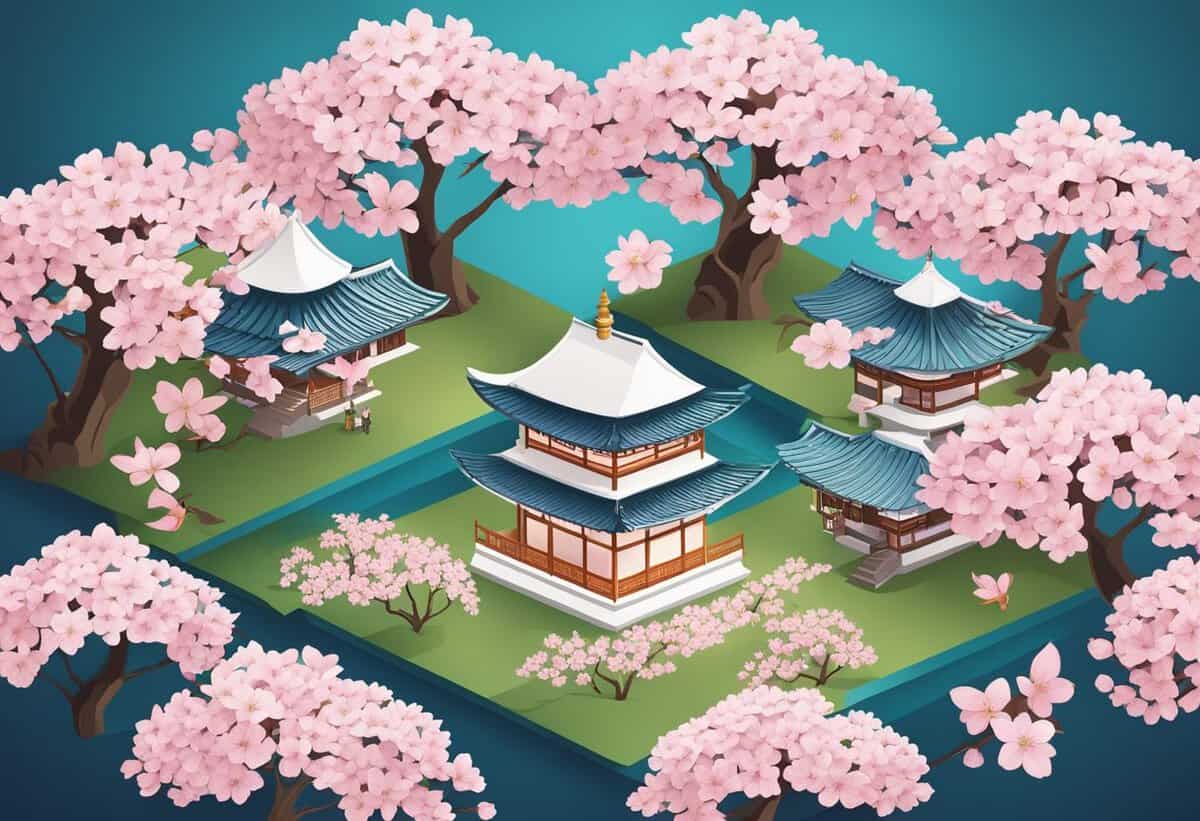Japanese Quotes: Inspiring Wisdom and Timeless Sayings from Japan
Japanese culture is rich with unique expressions of wisdom and values found in their proverbs, known as “kotowaza.” These Japanese sayings and quotes, often derived from observations of nature, history, and everyday life, offer insights into Japanese thought and perspectives. Through these Japanese quotes, you can gain a deeper appreciation of their culture and the universal truths they convey.

Some kotowaza, or Japanese sayings, deal with the concepts of jigoujitoku, the idea that one’s actions bring about their own rewards or consequences. As you explore these expressions, you’ll discover the value Japanese culture places on reflection, humility, and the pursuit of wisdom. Embracing these Japanese quotes and proverbs can enrich your own approach to life, applying lessons from a timeless culture to your everyday experiences.
Foundations of Life and Time

In this section, we’ll explore some Japanese quotes that touch on various aspects of life, time, and emotions, such as happiness, joy, hope, and the natural elements like the sun, moon, and darkness. Remember, Japanese quotes often contain profound wisdom that can guide you through life’s challenges and inspire you to appreciate each moment.
- Ichi-go ichi-e – “One time, one meeting.” This Japanese concept emphasizes the importance of treasuring each unrepeatable encounter you experience in your life. It serves as a reminder to make the most out of every meeting, as it may be a once-in-a-lifetime opportunity.
Moving on to some quotes that highlight the connection between life, time, and emotions:
-
“Even a journey of a thousand miles starts in front of your feet.” A gentle reminder to take things one step at a time and not be overwhelmed by the bigger picture. Focus on the present and make the most of it.
-
“Water and time are the two most priceless treasures we possess.” This quote emphasizes the essential and precious nature of time and life’s sustenance, urging you to appreciate and respect them.
-
“The best time to plant a tree was 20 years ago, the second best time is now.” This quote encourages you to take action at the present moment, rather than dwelling on the past or procrastinating into the future.
-
“The brightness of the sun can cast darkness on the moon, but the moon’s gentle glow can illuminate the darkest night.” In life, there is a balance between light and dark, hope and despair, joy and sadness. Embrace both aspects and learn from them.
Take your time to digest the meaning behind each quote and explore how you can apply them to your life. Such wisdom from Japanese culture can offer inspiration and guidance as you navigate life’s experiences.
Japanese Proverbs and Their Meanings

Quote List 1 – 25
-
Ishino uenimo sannen: This proverb translates to “perseverance prevails” and means that with hard work and determination, you can overcome any obstacle. It emphasizes the importance of persistence and patience in achieving your goals.
-
一期一会 (Ichi-go ichi-e): This beautiful Japanese proverb means “one time, one meeting” or “once-in-a-lifetime encounter.” It reminds us to cherish every encounter and experience, as they may never come again.
-
七転び八起き (Nana korobi ya oki): This motivational proverb translates to “seven times down, eight times up” and encourages you to keep pushing forward, no matter the setbacks and failures you face in life.
-
出る杭は打たれる (Deru kui wa utareru): Literally translated as “the stake that sticks out gets hammered down,” this proverb warns you against standing out or going against the norm, as it might draw criticism or unwanted attention.
-
猿も木から落ちる (Saru mo ki kara ochiru): This proverb translates to “even monkeys fall from trees,” reminding you that everyone makes mistakes and fails sometimes, regardless of their expertise or skill level.
Quote List 26 – 50
-
知らぬが仏 (Shiranu ga hotoke): This proverb means “not knowing is Buddha” and suggests that ignorance can sometimes be bliss. It is a reminder that it’s not always necessary to pursue knowledge or insight at the expense of peace of mind.
-
空き腹にまずいものなし (Akahara ni mazui mono nashi): This phrase translates to “there is no bad food for an empty stomach,” reminding you to appreciate what you have, as any food is good when you’re hungry.
-
光陰矢の如し (Kouin ya no gotoshi): This proverb translates to “time flies like an arrow,” emphasizing the fleeting nature of time and encouraging you to make the most of every moment.
-
琴瑟琵琶 (Kotoshitsu biba): This phrase means “happiness through harmony,” implying that true happiness can only be achieved when we are in harmony with ourselves and others.
-
笛吹けば五月蝿き (Fue fukeba urusai): Literally translated as “if you play the flute, the flies will come,” this proverb means that making a racket or drawing attention to oneself can lead to annoying and unwelcome consequences.
Quote List 51 – 75
-
亀の遠音 (Kame no too-to): This proverb means “slow but steady” and is used to encourage patience and determination in achieving your goals, as even the slow moving turtle can reach its destination with perseverance.
-
共鳴すれば金と銀が出る (Kyoumei sureba kin to gin ga deru): Translated as “unity is strength,” this proverb highlights that combined efforts and teamwork can bring about greater results than working independently.
-
傘と砂漠 (Kasa to sabaku): This phrase means “an umbrella in the desert,” illustrating the idea of something being useless or unnecessary in a specific context.
-
言うは易く行うは難し (Iu wa yasuku okonau wa muzukashii): This proverb translates to “saying is easy, doing is difficult,” emphasizing that it is easier to talk about a plan or intention than actually taking action and making it happen.
-
塵も積もれば山となる (Chiri mo tsumoreba yama to naru): This proverb means “even dust, if piled up, can become a mountain,” reminding you that small efforts can accumulate over time to produce significant results.
Quote List 76 – 100
-
蓼食う虫も好き好き (Tade kuu mushi mo suki suki): This phrase translates to “every bug to its own taste,” signifying that everyone has their own preferences and inclinations, and it’s important to respect them.
-
蛙の子は蛙 (Kaeru no ko wa kaeru): Translated as “a frog’s child is a frog,” this proverb implies that children often inherit the characteristics and traits of their parents.
-
後悔先に立たず (Koukai saki ni tatazu): This proverb means “regret never comes first,” reminding you that it’s important to consider the consequences of your actions before taking them, as regret often comes afterward.
-
覆水盆に戻らず (Fukusui bon ni modorazu): Translated as “spilled water will not return to the tray,” this proverb encourages you not to dwell on past mistakes, as they cannot be undone, and it’s more important to focus on moving forward.
-
曲がり角に触らぬ神も好かず (Magarikado ni sawaranu kami mo sukazu): This proverb translates to “even gods dislike those who don’t help themselves,” and suggests that relying solely on luck or divine intervention is not enough – you must also take action and put forth effort to achieve your goals.
Cultural Significance of Proverbs

Japanese proverbs, called kotowaza, have deep roots in the country’s cultural history. They can offer valuable insights into various aspects of Japanese culture, such as agrarian life, social values, and even the way the Japanese language itself is structured. In this section, we’ll explore some examples of Japanese proverbs and their cultural significance, covering areas like history, language learning, and relationships.
-
Ichi-go ichi-e (一期一会), roughly translating to “one time, one meeting,” is a phrase from Japanese tea ceremony culture that reminds us to cherish each unique moment, as it will never occur again. It is a good reminder to treasure the time you spend with your loved ones, as those moments are fleeting.
-
The Three Wise Monkeys are a Japanese pictorial maxim, representing the proverbial principle of “see no evil, hear no evil, speak no evil.” These monkeys are often used as a symbol of discretion and wisdom in communication.
-
The following proverb, Nanakorobi yaoki (七転び八起き), literally means “fall seven times, stand up eight.” This proverb is a reminder of the importance of perseverance and determination in the face of adversity.
Learning Japanese proverbs can enrich your understanding of the language and culture behind them, while also serving as a valuable tool for forming deeper connections with Japanese speakers and fostering relationships. By exploring these proverbs, you not only gain a refreshed perspective on life but also enhance your appreciation for the richness and depth of Japanese history and culture.
Learning from Proverbs

Action and Effort
Japanese proverbs have much to teach about the importance of action and effort. For example:
-
知らぬが仏 (Shiranu ga hotoke): Not knowing is Buddha, meaning sometimes it’s better not to know too many details before embarking on a new endeavor.
-
継続は力なり (Keizoku wa chikara nari): Perseverance is power, emphasizing the importance of practice and the development of skills.
Perseverance and Patience
The value of perseverance and patience can be found in these proverbs:
-
七転び八起き (Nana korobi ya oki): Fall seven times, stand up eight, inspiring us to never give up during hard times.
-
我慢は力 (Gaman wa chikara): Patience is strength, reminding us to maintain persistence even when faced with setbacks.
Risk and Reward
Japanese proverbs can also highlight the importance of risk and reward in our lives:
-
天辺に諸行無常 (Tenpen ni shogyô mujô): All things must pass like clouds in the sky, reminding us that taking risks can sometimes lead to profit or fortune.
-
出る釘は打たれる (Deru kugi wa utareru): The nail that sticks out gets hammered down, cautioning us that there may also be a cost when taking risks.
In summary, these Japanese proverbs provide valuable insights into a range of themes such as action, effort, perseverance, patience, and risk. May these proverbs help guide you throughout your life, serving as a source of wisdom and inspiration.






Share This
Share this post with your friends!